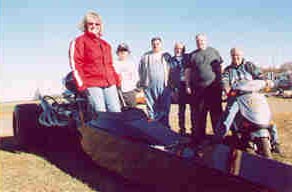
2. Purchases
A. Buy one Optima or racing battery, from Barnett
Performance or whoever;
B. Get rid of current water system and go with
braided steel line to the radiator, then buy
proper AN
fittings to plumb it, from Barnett Performance
or whoever;
C. Buy a tach, from Auto Meter or Barnett Performance,
then mount accordingly;
D. Go to Sears and buy a portable vacuum cleaner,
to suck water out of engine (alcohol promotes
milking of engine oil; this is a trick we learned
from racer and friend Robbie Callahan);
E. Buy at least five oil filters, plus buy cases
of motor oil, and keep seven quarts in trailer
and filter in trailer.
3. Check dragster
A. Check converter size and stall and fix accordingly,
either by purchase or converter freshening up
(we don't know the stall speed of our present
converter);
B. Check starting line rpm leave and adjust
accordingly, via MSD chips;
C. Find out if we have the proper slicks (who
knows, maybe they're the wrong size or compound);
D. Check all nuts and bolts for proper tightening
(and do this every race).
4. Fixes
A. Freshen up transmission (who knows how many
runs it has on it now);
B. Change motor oil only after the car returns
from updates from Tommy Harris;
C. Finish painting red places on dragster frame
(I missed a few this past summer);
D. Fix "donut" dragster cushion (we
bought a used one from Robbie Callahan).
That's it for now. Maybe by early spring, Mr.
Suncoast will be ready and able to do battle
in the deep South bracket wars. We hope our
fixes will help.
 |
|
Wife
Fran poses with her Mr. Suncoast
'89 Suncoast dragster while friends,
from left, Randall Roop, Fuzzy Garland,
Al Baker, Joe Tatun and Artie "the
Preacher" Fulcher look on.
|
|
By the way, Fran DID make her first winning
round in the dragster. It happened on Saturday
at the Trots, first round. She was lined up
against a slower car. She let go on the crossover,
but then the car launched a few feet and skidded
to a stop, the results of tire shake reactivating
the trans brake button (That will be fixed,
too.). Meanwhile, the guy in the other lane
was rolling to a stop, the results of one of
his axles breaking. She saw what was going on,
got back into the throttle and crossed the finish
line first, with a 58-mph pass, while he went
through at 14 mph.
Oh, well, a win's a win. At least that saved
us some $$ in the buy-back department. Adios,
amigos.
Double-A Dale's Tech Tip for
this month
You'll notice in the above story that I mention
a dragster "donut" cushion. That is yet another
piece of equipment we found that all dragster
racers need for towing in an enclosed trailer.
The donut in question is a small garbage can-sized
piece of rubber that is sandwiched together
over a cloth "bladder" inside, and it sits on
the floor of our enclosed trailer with the dragster
resting on it.
What it does is prevents the long dragster
from flexing in the trailer while on the road
(and believe me, there are plenty of highways
and byways in Alabama and Georgia that are plenty
rough). They can cost upwards of $200 from parts
houses and chassis shops, but we bought ours
from friend Robbie Callahan for a lot less.
You want to place the donut directly under
a crossbar on the frame, preferably around the
roll cage, where it is compressed enough to
prevent the car from flexing up and down when
towing. We know of one friend who towed without
one, and he had to have his dragster frame re-welded
in several places because it cracked in two.
We figure that the money we laid out for our
donut is a lot cheaper than having a chassis
man like our Tommy Harris of Fabrication Concepts
re-weld a cracked chassis.
How do you place it under your dragster when
the dragster is positioned in the trailer for
towing? Again, this is where friends helped.
At our last race of the 2003 season, the Turkey
Trots at Huntsville Dragway, Joe Tatum and Doug
Richardson --- no weightlifters, either ---
merely lifted up the front end while we slid
the donut under Mr. Suncoast's roll cage. A
small jack can do the same job just as easy.

|